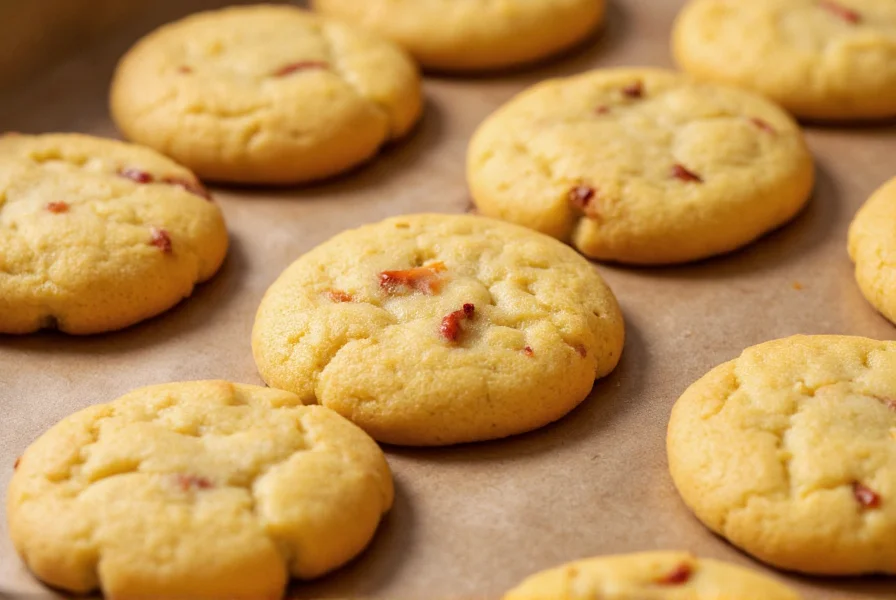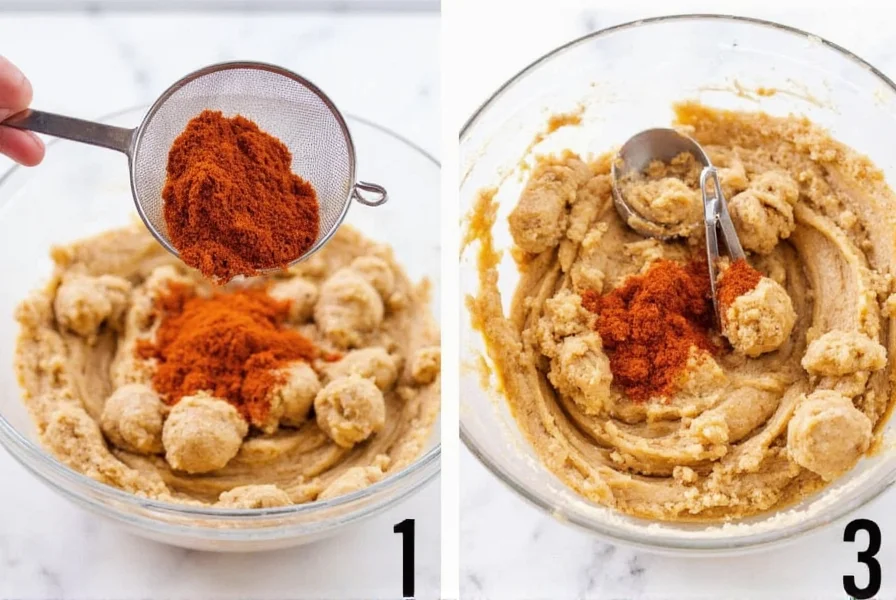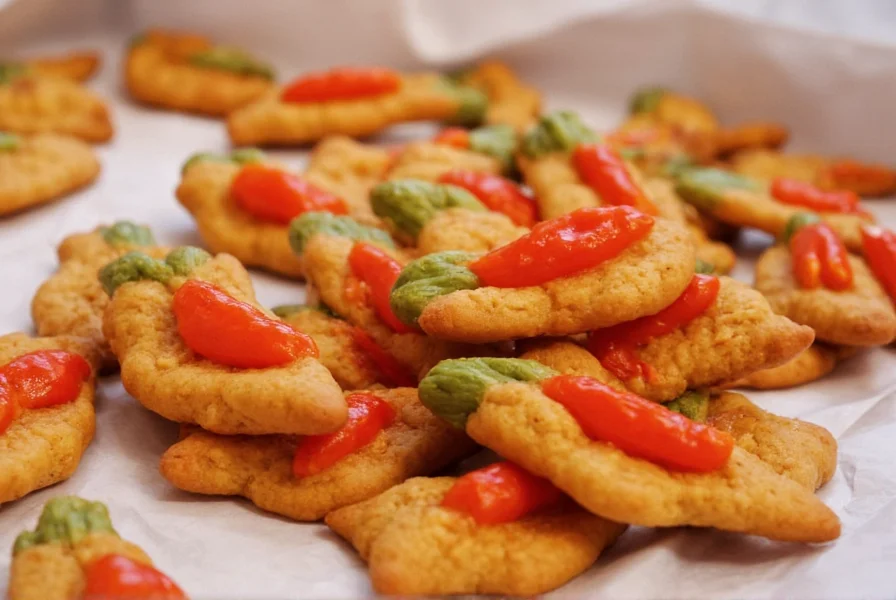The Science Behind Sweet and Spicy Harmony
Understanding why chili pepper cookies work requires examining how our taste receptors respond to contrasting flavors. When capsaicin from chili peppers activates TRPV1 receptors responsible for heat sensation, it creates a physiological response that actually enhances our perception of sweetness. This neurological interplay explains why the combination feels balanced rather than conflicting.
Professional pastry chefs leverage this phenomenon by carefully calibrating chili-to-sugar ratios. The fat content in cookie dough (typically from butter) helps dissolve capsaicin compounds, distributing heat more evenly than water-based recipes. This scientific approach to creating balanced chili chocolate cookies ensures each bite delivers complexity without overwhelming spice.

Historical Roots of Spicy-Sweet Baking
The tradition of combining chili and sweet elements dates back centuries. Ancient Mesoamerican cultures mixed cacao with chili peppers long before European contact. Spanish colonists later adapted this practice, creating early versions of traditional Mexican chocolate chili cookies that influenced modern interpretations.
In contemporary cuisine, chefs like Rick Bayless and José Andrés have popularized this fusion, demonstrating how regional ingredients can create globally appealing treats. The current popularity of artisanal spicy cookie recipes reflects both this historical legacy and modern culinary experimentation.
Selecting the Perfect Chili Variety
Not all chili peppers work equally well in cookie recipes. The ideal varieties balance heat with complementary flavor notes:
| Chili Type | Scoville Units | Flavor Profile | Best For |
|---|---|---|---|
| Ancho | 1,000-2,000 | Fruity, raisin-like | Mild chocolate chili cookies |
| Guajillo | 2,500-5,000 | Berry, tea-like | Medium-heat variations |
| Chipotle | 5,000-10,000 | Smoky, earthy | Robust flavor profiles |
| Cayenne | 30,000-50,000 | Sharp, clean heat | Subtle background warmth |
For beginners, starting with ancho or guajillo peppers provides noticeable chili flavor without excessive heat. Experienced bakers experimenting with advanced chili pepper cookie techniques might blend multiple varieties for layered complexity.
Perfect Homemade Chili Pepper Cookie Recipe
This tested recipe yields 24 cookies with balanced heat and sweetness. The secret lies in properly preparing the chili component before incorporation.
Ingredients
- 2 cups all-purpose flour
- 1 tsp baking soda
- 1/2 tsp salt
- 1/4 cup finely ground ancho chili powder (sifted)
- 3/4 cup unsalted butter, room temperature
- 3/4 cup brown sugar
- 1/2 cup granulated sugar
- 1 large egg
- 2 tsp vanilla extract
- 1/2 tsp cinnamon (optional)
- 4 oz dark chocolate (70%), finely chopped
Preparation Method
- Prepare chili component: Sift chili powder to remove any coarse particles that could create uneven heat pockets
- Cream butter and sugars: Beat until light and fluffy (about 3 minutes)
- Add wet ingredients: Incorporate egg and vanilla until fully combined
- Mix dry ingredients: Whisk flour, baking soda, salt, and sifted chili powder
- Combine: Gradually add dry ingredients to wet mixture on low speed
- Fold in chocolate: Mix until just incorporated (overmixing creates tough cookies)
- Chill dough: Refrigerate for minimum 2 hours (essential for flavor development and preventing overspreading)
- Bake: 375°F for 10-12 minutes until edges are set but centers remain soft

Troubleshooting Common Issues
Even experienced bakers encounter challenges with spicy baked goods recipes. Here's how to address frequent problems:
- Uneven heat distribution: Always sift dried chili powders and consider making a chili-infused butter by gently heating butter with chili flakes, then straining
- Overpowering heat: Balance with additional sugar or a pinch of salt; remember heat perception increases as cookies cool
- Flat cookies: Ensure proper chilling time (minimum 2 hours) and check baking soda freshness
- Muted chili flavor: Use high-quality, fresh chili powder; older spices lose volatile compounds responsible for flavor
Creative Variations to Explore
Once you've mastered the basic technique, experiment with these sophisticated adaptations:
- Chili-lime cookies: Add 1 tbsp finely grated lime zest to complement the heat
- Smoky chipotle variation: Replace ancho with chipotle powder and add 1/4 tsp smoked salt
- White chocolate chili cookies: Substitute dark chocolate with white chocolate for a different flavor profile
- Gluten-free adaptation: Use 1:1 gluten-free flour blend and add 1/2 tsp xanthan gum
Serving and Storage Recommendations
Chili pepper cookies reach their flavor peak 24 hours after baking, as the spices fully integrate with other ingredients. For optimal enjoyment:
- Pairing suggestions: Serve with cold milk, vanilla ice cream, or a mild coffee to balance the heat
- Storage: Keep in airtight container at room temperature for up to 5 days; the chili flavor will mellow slightly over time
- Freezing: Dough balls can be frozen for up to 3 months; bake from frozen adding 1-2 minutes to baking time
- Gift presentation: Package in decorative boxes with tasting notes explaining the flavor profile
Frequently Asked Questions
How can I make chili pepper cookies less spicy?
Reduce the chili powder to 2 tablespoons and add 1/4 teaspoon of cinnamon, which complements the flavor while reducing perceived heat. You can also increase the sugar content by 2 tablespoons to balance the spiciness.
Can I use fresh chili peppers instead of dried powder?
Yes, but with adjustments. Finely mince 1-2 fresh jalapeños (seeds removed for milder heat), then sauté in 2 tablespoons of the recipe's butter until softened. Cool completely before incorporating. Fresh peppers add moisture, so reduce other liquids by 1 tablespoon.
Why do my chili cookies taste bitter?
Bitterness usually comes from either old or low-quality chili powder, or from burning the spices during preparation. Always use fresh, high-quality chili powder from a reputable source, and never cook chili powder dry - always incorporate it with other dry ingredients to prevent scorching.
How long do chili pepper cookies stay fresh?
Properly stored in an airtight container at room temperature, chili pepper cookies maintain optimal texture and flavor for 4-5 days. The chili flavor will mellow slightly over time. For longer storage, freeze baked cookies for up to 3 months - thaw at room temperature before serving.











 浙公网安备
33010002000092号
浙公网安备
33010002000092号 浙B2-20120091-4
浙B2-20120091-4